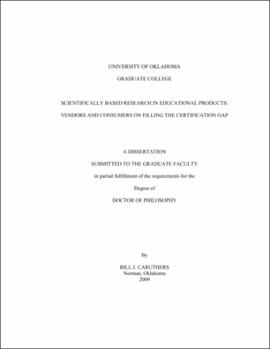| dc.contributor.advisor | Maiden, Jeffrey||Vaughn, Courtney A | |
| dc.creator | Caruthers, Bill J. | |
| dc.date.accessioned | 2019-04-27T21:29:14Z | |
| dc.date.available | 2019-04-27T21:29:14Z | |
| dc.date.issued | 2009 | |
| dc.identifier | 99226040802042 | |
| dc.identifier.uri | https://hdl.handle.net/11244/318796 | |
| dc.description.abstract | SCIENTIFICALLY BASED RESEARCH IN EDUCATIONAL PRODUCTS: | |
| dc.description.abstract | VENDORS AND CONSUMERS ON FILLING THE CERTIFICATION GAP | |
| dc.description.abstract | By | |
| dc.description.abstract | Bill Caruthers | |
| dc.description.abstract | University of Oklahoma | |
| dc.description.abstract | Co-Major Professors: Jeffrey Maiden, Ph.D. and Courtney A.Vaughn, Ph.D. | |
| dc.description.abstract | The 2002 reauthorization of the Elementary and Secondary Education Act, or No Child Left Behind (NCLB) changed school law in the United States. Public schools can utilize federal funds to purchase only those educational products subject to scientifically based research. No dedicated certification intermediary (CI) exists to determine individual product compliance with SBR. This research undertakes to: 1.) | |
| dc.description.abstract | Examine the NCLB Scientifically Based Research (SBR) requirement; 2.) Document the historical development of certification intermediaries; and 3.) Study the research question: How do educational product vendors and education administrators agree and/or differ in relation to the SBR mandate and on the potential to produce an SBR | |
| dc.description.abstract | certification entity valuable to each? | |
| dc.description.abstract | The historical and contextual review of scientifically based research and the development of certification intermediaries throughout industrial history suggest the potential emergence of a certification intermediary in this area. Utilizing the grounded theory methodology of Strauss and Corbin, appropriate here due to the lack of specific research in this area; the subject was examined from the vendor and consumer perspectives. The emergent data supports the theory that: Concerning the SBR mandate, vendors and consumers have far more in common than initially known; and, Vendors and consumers support the emergence of an independent certification intermediary for SBR compliance through a marketplace stakeholder coalition. Future empirical research | |
| dc.description.abstract | on this theory is encouraged. | |
| dc.format.extent | 155 pages | |
| dc.format.medium | application.pdf | |
| dc.language | en_US | |
| dc.relation.requires | Adobe Acrobat Reader | |
| dc.subject | School purchasing--United States | |
| dc.subject | Instructional materials industry--Certification--United States | |
| dc.title | SCIENTIFICALLY BASED RESEARCH IN EDUCATIONAL PRODUCTS: VENDORS AND CONSUMERS ON FILLING THE CERTIFICATION GAP | |
| dc.type | text | |
| dc.type | document | |
| dc.thesis.degree | Ph.D. | |
| ou.group | Jeannine Rainbolt College of Education::Department of Educational Leadership and Policy Studies | |
